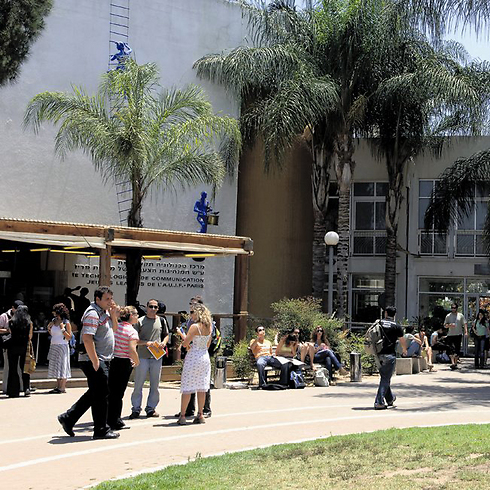
The 'Itbah al Yahud' hamsa presented as part of 'The Power of Word' exhibition
באדיבות מכללת ספיר
Politics belongs in the academia
Op-ed: The main reason for encouraging political activity on campus stems from the principle of pursuing the truth and the assumption that there is sometimes more than one truth.
An exhibition called "The Power of the Word" was displayed last week at the new gallery inaugurated at the Sapir Academic College.

Artist Gal Volinez chose to present hamsas (palm-shaped amulets believed to protect against the "evil eye") with the captions "ISIS," "Itbah al Yahud" (slaughter the Jews) and "In blood and fire we will redeem Palestine."
The presentation of these words in an exhibition which seeks to express the power of the word through art, stirred a row. During a student protest held outside the exhibit, one of the students said that the academia – which is supported with public funds – should not be allowed to engage in politics.
For the sake of full disclosure, I played a role in establishing the Sapir Academic College and in designing its political way. Yes, political. The academia cannot be separated from politics. The academia's very essence expresses political thought.
The first academic lecturer was Socrates, Plato's teacher, who lectured at a plantation which was allotted to him 2,500 years ago by Academus, one of Athens' wealthiest people – and this is where the word academia comes from. Socrates was sentenced to death for treason over the things he said at the academia.
And so, since its inception to this very day, the academia has been suspected of subversion – and rightfully so. The academia is subversive because pursuing the truth undermines the current situation and searches for a different truth through research and studies.

The Sapir Academic College. 'The road towards building a leadership which will bring along different politics is long, and requires us to continue encouraging political activity among students and lecturers' (Photo: Tsafrir Abayov) (צילום: צפריר אביוב)
Some of the big questions raised by the academia are clearly political. For example, whether man and the universe were created or are the fruit of an evolutionary development – a question which is also politically controversial.
So is the academic research discussing the origins of monotheism, which places pharaonic Egypt as the first to believe in one God and challenges the claim that the ancient Hebrews were the first to recognize a hidden God.
Even the question "why democracy?" is political, and so are its answers.
The Sapir College was founded as an independent college during the heated days of the dispute over the Oslo Agreements. Later on, we experienced firsthand the bitter dispute over the disengagement from Gaza, as dozens of Sapir's students were residents of Gush Katif, and the campus raged.
The common solution for calming down the situation was to ban political activity on campus. That's what all other universities and colleges did. But at Sapir we decided to do the opposite and bring the political activity into the campus.
The main reason for encouraging political activity at Sapir stemmed from the principle of pursuing the truth and the assumption that there is sometimes more than one truth.
And there was another reason: Israeli politics was showing signs of corruptibility. More and more politicians were revealed as corrupt.
We wanted to design a different type of leaders among Sapir's students – not princes who gained a place at the top thanks to their fathers, or messengers of the extensive capital-government system. The alternative we sought to nurture was of students who would be watchful towards politics, strong-minded and, most importantly, bearers of good news.
We set one limitation for encouraging politics on campus: A lecturer must not misuse the advantage given to him by his position. And so discussions of political questions, like the ones mentioned earlier, in the classroom would only take place as part of the course's disciplinary framework and would not spill over to parties' banal politics, and a variety of opinions would be presented while pursuing objectivity.
The road towards building a leadership which will bring along "different politics" is long, and requires us to continue encouraging political activity among the students, as well as among the lecturers.
The dispute created by "The Power of the Word" exhibition is important for politics and very important for students, as its existence reflects the academia's role in society and its good essence.
Prof. Ze'ev Tzahor is the founder and former president of the Sapir Academic College.










